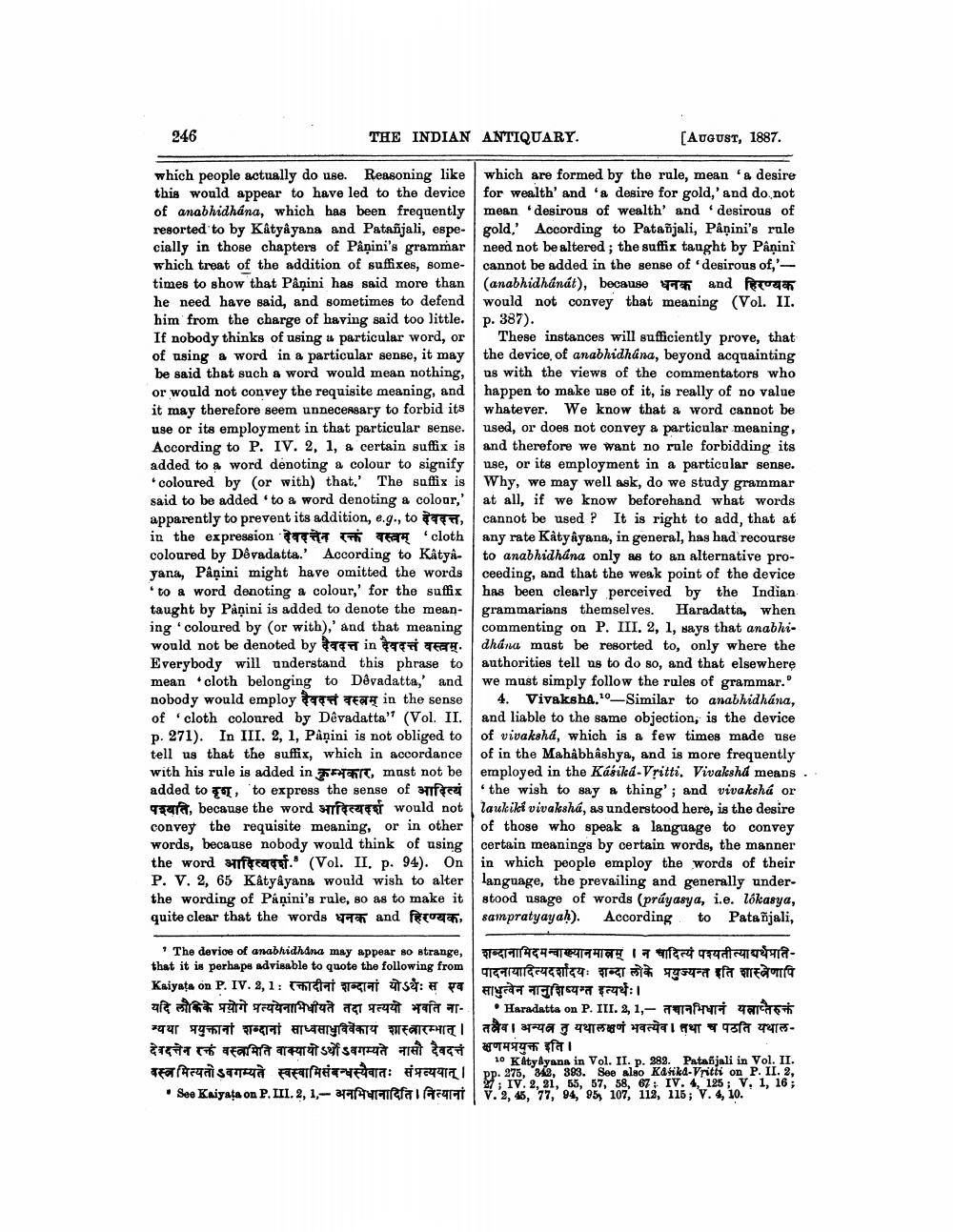________________
246
THE INDIAN ANTIQUARY.
[AUGUST, 1887.
which people actually do use. Reasoning like which are formed by the rule, mean a desire this would appear to have led to the device for wealth' and 'a desire for gold,' and do not of anabhidhána, which has been frequently mean desirous of wealth and desirous of resorted to by Katyayana and Patañjali, espe- gold' According to Patañjali, Påņini's rule cially in those chapters of Påņini's grammar need not be altered; the suffix taught by Påņini which treat of the addition of suffixes, some- cannot be added in the sense of desirous of,' - times to show that Påņini has said more than (anabhidhánát), because and a he need have said, and sometimes to defend would not convey that meaning (Vol. II. him from the charge of having said too little. p. 387). If nobody thinks of using u particular word, or These instances will sufficiently prove, that of using a word in a particular sense, it may the device, of anabhidhana, beyond acquainting be said that such a word would mean nothing, us with the views of the commentators who or would not convey the requisite meaning, and happen to make use of it, is really of no value it may therefore seem unnecessary to forbid its whatever. We know that a word cannot be use or its employment in that particular sense. used, or does not convey a particular meaning, According to P. IV. 2, 1, & certain suffix is and therefore we want no role forbidding its added to a word denoting a colour to signify use, or its employment in a particolar sense. * coloured by (or with) that.' The suflix is Why, we may well ask, do we study grammar said to be added to a word denoting a colour, at all, if we know beforehand what words apparently to prevent its addition, e.g., to TTT cannot be used ? It is right to add, that at in the expression T
T6 cloth any rate Kâtyâyana, in general, has had recourse coloured by Dévadatta. According to Katya- to anabhidhána only as to an alternative proyana, Paņini might have omitted the words ceeding, and that the weak point of the device * to a word denoting a colour,' for the suffix has been clearly perceived by the Indian taught by Påņini is added to denote the mean- grammarians themselves. Haradatta, when ing coloured by (or with),' and that meaning commenting on P. III. 2, 1, says that anabhiwould not be denoted by in T THE dhána must be resorted to, only where the Everybody will understand this phrase to authorities tell us to do so, and that elsewhere mean cloth belonging to Dévadatta,' and we must simply follow the rules of grammar." nobody would employ Tea in the sense 4. Vivaksha.10—Similar to anabhidhána, of cloth coloured by Devadatta" (Vol. II. and liable to the same objection, is the device p. 271). In III. 2, 1, Panini is not obliged to of vivaksha, which is a few times made use tell us that the suffix, which in accordance of in the Mahâbhâshya, and is more frequently with his rule is added in F airt, must not be employed in the Kásiká-Vritti. Vivaksha means. added to , to express the sense of
the wish to say a thing'; and vivakshá or quat, because the word sich would not laukiki vivaksha, as understood here, is the desire convey the requisite meaning, or in other of those who speak a language to convey words, because nobody would think of using certain meanings by certain words, the manner the word focacaf." (Vol. II, p. 94). On in which people employ the words of their P. V. 2, 65 Katyayana would wish to alter language, the prevailing and generally under the wording of Páņini's rule, so as to make it stood usage of words (práyasya, i.e. lokasya, quite clear that the words धनक and हिरण्यक, । sampratyayah). According to Patañjali,
The device of anabhidhana may appear so strange, शब्दानामिदमन्वाख्यानमानम् । नचादित्यं पश्यतीत्याबर्थप्रतिthat it is perhaps advisable to quote the following from
पादनायादित्यदर्शादयः शन्दा लोके प्रयुज्यन्त इति शास्त्रेणापि Kaiyata on P. IV. 2, 1: tratat ca 52: F arga rrut: 1 यदि लौकिके प्रयोगे प्रत्ययेनाभिधीयते तदा प्रत्ययो भवति ना- Haradatta on P. III. 2, 1,- aani Tan * न्यथा प्रयुक्तानां शब्दानां साध्वसाधुविवेकाय शास्त्रारम्भात् । तवैव । अन्यत्र तु यथालक्षणं भवत्येव । तथा च पठति यथालदेवदनेन रकं वस्त्रमिति वाक्यायोऽर्थोऽवगम्यते नासौ दैवदनं
क्षणमप्रयुक्त इति।
10 Katydyana in Vol. II. p. 289. Patañjali in Vol. II. Tarya sa FFTTT Yara: 644421 pp. 275, 22, 393. See slao Katika-rithi on P. II. 2,
21 ; IV. 2, 21, 55, 57, 58, 67: IV. 4, 125; V. 1, 16; • See Kaiyata on P. III. 2, 1-aar a faifaTi V.2, 46, 77, 94, 95, 107, 112, 116; V. 4, 10.




